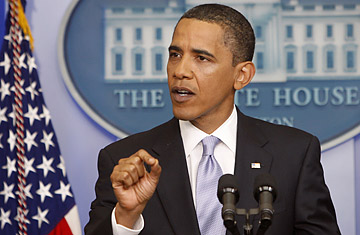
President Barack Obama takes questions from the press on June 23, 2009
Hawks and neocons in Washington believe the Iranian regime's brutal crackdown on its own people demands tougher U.S. action. President Barack Obama's response to the crisis had been too timid, say Republican Senators John McCain, Lindsey Graham and Chuck Grassley. Former Bush Administration adviser Dan Senor and Op-Ed writers have urged a more aggressive approach, including reaching out to the protesters and their leaders.
Yet Obama's cautious stance has been endorsed by a broad group of U.S. foreign policy makers, from Henry Kissinger and Richard Lugar on the right to John Kerry and Howard Dean on the left. By avoiding being seen to "meddle" in Iran's internal affairs, say his backers, Obama has blunted attempts by Tehran's hard-line leaders to blame the protests on foreign intervention. "I think the President has handled this well," Kissinger told Fox News on Sunday. "Anything that the United States says that puts us totally behind one of the contenders ... would be a handicap for that person."
Still, if Obama has an edge in the debate within the U.S. foreign policy establishment, the political stakes remain high for him. As an untested foreign policy hand, even a minor mishandling of an international crisis could damage his reputation for a long time to come. All the more reason for Obama to be cautious, and that is exactly how his advisers are telling him to handle the situation. The risks in staking out a position ahead of events are greater than the risks of trailing them, they say.
As a result, Obama's approach to the crisis has been to adjust his rhetoric in response to events, but to stick by the hands-off strategy. Obama continues to modulate his tone, as he did in a June 23 press conference, upping his criticism of the regime. "The United States and the international community have been appalled and outraged by the threats, beatings and imprisonments of the last few days," the President said. "I strongly condemn these unjust actions, and I join with the American people in mourning each and every innocent life that is lost."
When it comes to whether or not to negotiate with Iran over its nuclear program, however, the President still maintains that overriding American interests must prevail — and he remains committed to his offer of talks with the regime. "There is a path available to Iran, where their sovereignty is respected," Obama said. "We are interested in healing some of the wounds of 30 years."
For now, the U.S. President's ability to do damage on the ground in Iran is much greater than his capacity to do good. Most reporting out of Iran makes clear that neither the protesters nor the leaders of Iran want Obama to openly side with them. Even without U.S. meddling, the mullahs have tried to blame Obama for the mess; imagine if Obama did as Bush aide Senor has suggested and tried to call opposition leader Mir-Hossein Mousavi.
Nevertheless, the political danger is real for Obama. If things go badly in Iran and the death toll mounts, it could hurt him — not because war-weary Americans expect him to intervene to stop the carnage, but because he could appear unsure and inexperienced. Republicans have seen Obama hurt by that vulnerability before. When Georgia attacked the breakaway territory of South Ossetia last summer and Russia invaded Georgia, McCain came out early and strongly in favor of Georgian President Mikheil Saakashvili, while Obama called on both sides to avoid violence. For a week or so, at least in the domestic debate, McCain had the upper hand, as the Russians were seen as returning to their expansionist Soviet past at the expense of the would-be Democratic regime in Tbilisi.
With that in mind, Obama's aides are trying to keep the President's rhetoric up to date with events, but not to allow his strategy to be changed by them. The President will attempt to address increasing violence if it happens, but don't expect him to reprise McCain's rhetorical flourish of last summer by declaring that we are all Iranians. Speaking forcefully makes sense if America has the means and the will to change the outcome in Iran; if not, then empty rhetoric does more harm than good, both to Iranian protesters and to U.S. credibility.
